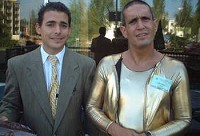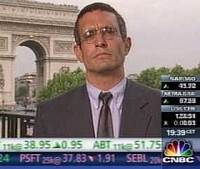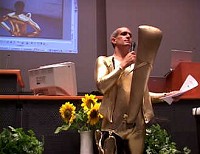 A Suspension of Disbelief
A Suspension of Disbelief Andy Bichlbaum and Mike Bonanno have been called urban satirists, corporate saboteurs and performance artists. Before meeting, their early pranks involved challenging gender stereotypes by inserting gay muscleboys in the background of an especially violent and macho videogame, as well as famously swapping the voiceboxes between Barbie dolls and G.I.Joes.
Andy Bichlbaum and Mike Bonanno have been called urban satirists, corporate saboteurs and performance artists. Before meeting, their early pranks involved challenging gender stereotypes by inserting gay muscleboys in the background of an especially violent and macho videogame, as well as famously swapping the voiceboxes between Barbie dolls and G.I.Joes. Together as the Yes Men, they have moved into much more political territory, highlighting the hypocrisy between what people say and what they do. Everyone knows this, and the Yes Men aim to simply point out the fact that the West has become blinded to the fact that we're willing to accept dishonestly and injustice as a daily fact of life.
The documentary based on their life, made by the team behind American Movie, will probably change their modus operandi, simply because they'll be more recognisable. Although as one segment of the film shows, people are startlingly blind about these kinds of things.
There's been a US Presidential election since you finished making the film.
Bichlbaum: For four months we went around campaigning for George W Bush. We bought a used bus and turned it into a fairly fancy looking Bush campaign vehicle and tried to go around doing satire in such a way that people would notice what we were saying. We were basically portraying Bush policies in too clear a way. Nobody ever seemed to notice. We had people sign up to the ‘Patriot Pledge’ in favour of increasing global warming because it could end up helping the US. It might lead to climate destabilisation, but that would adversely effect Europe more than the US. That’s actually true, the Pentagon has actually produced a paper on it, so we put that out there. But nobody seemed to mind.
It seems like the targets of your satire often miss the point.
Bonanno: That’s accurate. Rarely have we been able to make satire that has worked in the way that you expect it to work. Like when a light bulb goes off at a certain point and people go, ‘Ah, this couldn’t be true. These guys couldn’t be real!’
Bichlbaum: We ascribe that to the fact that the real policies that these people actually live with, these ideologies are just as grotesque as the versions that we’re portraying.
When Mr Bush reacted to you by saying, ‘There ought to be limits to freedom’, was that gaffe a gift to you?
Bonanno: There’s this funny thing that they call a gaffe, which is when they’re honest by mistake. That’s what happened there, he was honest by mistake. We can see that this is his policy now, that he has curtailed the freedom of many in the United States. He was being honest for a second.
Bichlbaum: It’s not so rare really, he’s very often equally clear. But his voter base doesn’t seem to mind. They agree with it.
Based on the American election, there seems to be a great disparity between the intellectual liberal classes and the forces of neo-conservatism.
Bichlbaum: It’s not that it’s such a vast thing in favour of Bush; a lot of it I think is that they’re more easily mobilised because of the church. Our film played in Chicago, but not the rest of the Midwest.
Bonanno: We want to take the movie to other places but we haven’t gotten around to that yet. There’s a plan to go and do university tours, where we go and show the movie and talk about what corporate globalisation is, and what the WTO is, and why people should be wary of it. That will probably still happen.
Even in today's media age it seems that it's only the independent and documentary filmmakers who offer a dissenting voice to the established orthodoxy.
Bichlbaum: It seems like this huge wave of documentaries has come out of the same historical moment, with the failure of the US media to express any perspective other than the establishment perspective. So something has had to fill the gap and it’s been comedy shows on TV, like The Daily Show with Jon Stewart. They’re the ones that have been the sources of information for lots of people because the TV news isn’t doing it.
Is Europe any different?
Bonanno: Definitely. We often talk about Jonathan Swift, going way back. There’s all these great comedians on television too, people like Chris Morris [Brass Eye], who we’re really inspired by. We also used to work with some groups here, like Decadent Action, on projects that were interesting or dynamic, or based in this kind of satire.
Yet people do seem to be oddly gullible, as you prove in your film.
Bichlbaum: As long as what you’re saying is roughly within their frame of reference. To ordinary people some of the things we suggest seem like horrendous schemes, but to some in our audience they were just detailed kind of versions of what they were used to talking about that was maybe a little weird, maybe not.
People don’t want to question things for the risk of appearing foolish.
Bichlbaum: The point we want to make with that was that these people are listening to this kind of grotesque drivel all the time.
What about some of the more outrageous props – like the shiny gold suit with the three-foot phallus? It must be hard for Mike to keep from laughing when you see Andy reveal it in all its glory.
Bonanno: For me there were moments when it was hard to keep a straight face. Not so much during that stunt, because for that one I was actually panicking trying to make the computer work and stupidly, I was advancing the slides at the wrong time. So it was easy for me to keep a straight face.
Bichlbaum: Even if you did crack up the audience would say ‘he’s kooky’. If you can inflate a three foot phallus and they don’t think that’s out of character, then you could certainly crack up laughing without them thinking that was weird either.
Is it tough to be ruthless, following through against individuals who might in reality be quite nice in themselves?
Bichlbaum: Not really, because we’re in the story and we’re talking to them within this thing. As far as they’re concerned, we are representatives of the WTO, so we’ve had perfectly nice, friendly conversations with them. And in Australia especially we were able to constructively think through a solution to world poverty brought on through corporate globalisation. That was a perfectly nice thing to be engaged with them on.
Is it hard to stay in character at times?
Bichlbaum: That actually comes from the audience. If you look carefully, I don’t do a very good job of it. I’m not a good actor. If it’s fully convincing at the time it’s mostly the audience who believe it. So it’s a suspension of disbelief. I don’t have to do it on the audience they do it on me and I end up believing it.
THANKS TO ANDY TIMMS AT SUBSTANCE001, FEB.05

Mike Bonanno and Andy Bichlbaum

Surely you jest: Bichlbaum as a WTO spokesman on CNBC (above); and at a trade
conference demonstrating that
gold lamé suit, which helps businessmen keep an eye on sweatshop workers (below)

See also:
THE YES MEN WEBSITE

